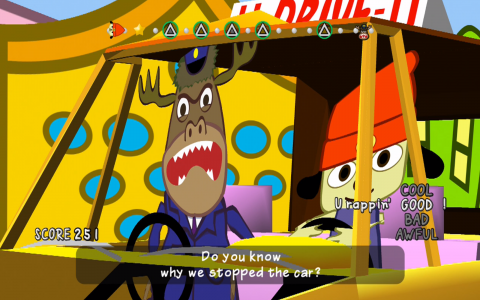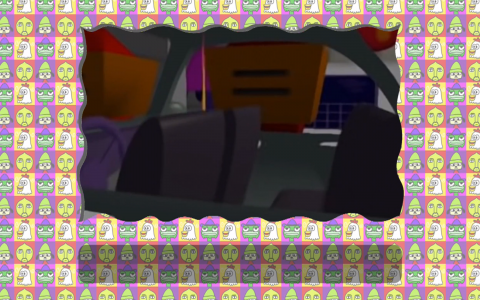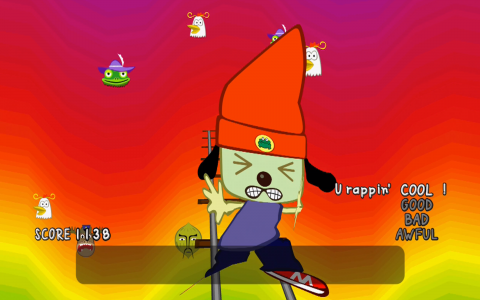Games are memorable for different reasons. For Spelunker, people remember the difficulty, where as BioShock has an unforgettable story. Usually there is more to the appeal than this one aspect, but that isn’t always the case. For better or worse, PaRappa the Rapper is remembered for its catchy songs and style, over the frustrating and arguably confusing gameplay. Now that some time has passed, the original game has been remastered on the PlayStation 4. With improved graphics and other changes, is this a must for fans or is it a reminder of simpler times.
For a game as cartoony as PaRappa the Rapper is, it tells a surprisingly relatable story. PaRappa has a crush on his friend Sunny Funny and wants to make his dream a reality. Unfortunately, not only does PaRappa feel inadequate in his quest to be with Sunny Funny, he also feels that way next to Joe Chin, the classic successful pretty boy. These feelings lead to a series of raps related to improving his inadequacies and win the heart of Sunny Funny.
The thing that stands out with the story isn’t that so much is conveyed in the span of roughly 20 minutes, it’s PaRappa’s outlook on the world. Instead of accepting what he can’t control, he attempts to fix things and approaches life with his now catchphrase “I gotta believe.” This same positivity appears in the songs, making for an adventure that is not only cute, but a lot of fun.
As mentioned above, PaRappa the Rapper’s most memorable aspect are the songs. From Master Onion’s karate rap to his final show, every song is catchy, with plenty of small touches. For instance, PaRappa doesn’t just parrot the instructors rap, he changes things where appropriate. So when Instructor Mooselini notes she forgot to close the door, PaRappa says you instead of I. These small touches stand out, as do all the subtle things in the background. Be it ninjas on the first stage or messing up the turn if you fail to do the rap correctly on the second song.
Beyond simply following your instructor’s words, PaRappa is about laying down your own rhymes that follow the beat. This makes explaining PaRappa the Rapper difficult, since you’re suppose to feel the beat and input accordingly, instead of simply mashing buttons or doing what you want. Not only is this style of play hard to explain, the game does a poor job of explaining it.
Even with the included practice mode, it’s possible to have no real idea of how you’re suppose to play and the added instruction manual doesn’t help matters. At times it makes no sense, especially if you look at the score, but the difficulty seems lower in this installment. However, this isn’t true for every song.
For one reason or another, the timing on the fourth song seems to be off. Even though I can easily maintain good or better on the other five songs, I can rarely pass it, much less achieve cool. This alone makes a hard to grasp game way more difficult than it should be.
In addition to that, the remaster itself leaves a lot to be desired. Even though the levels have been redone, it makes use of the original cutscenes. This makes for strange transitions, considering you’re going from blurry and low quality PlayStation graphics to visuals enhanced for the PlayStation 4. This choice is even much confusing when you consider there really aren’t that many cutscenes and the ones included are pretty short.
Verdict
PaRappa the Rapper Remastered does an okay job of bringing the classic forward. The gameplay definitely feels easier than previous versions, though one of the six songs is still fairly difficult. Combine this with only some of the graphics being upgraded and you have a decent game. Great if you want to relive the game you loved or see what this classic is like, but otherwise nothing special.



